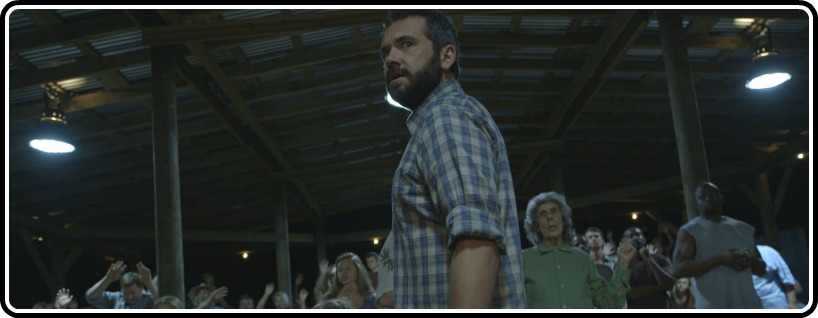It’s hard to truly stand out in today’s modern genre film landscape. Particularly in the world of horror cinema, most directors have real difficulty standing out in a landscape that prides itself on being drive by tropes and cliches. However, when they are able to make the genre bend to their voice instead of the opposite, something truly special comes into this world. We’ve seen it before with names like Wes Craven and John Carpenter, and now, with real auteurs like James Wan, we may be hitting a new golden age for genre filmmakers.
One of these standout names is also part of one of the more interesting filmmaking “cliques” we currently have today, and is back with a brand new film available in theaters and on VOD. Ti West really launched himself into the stratosphere with his masterpiece, The House Of The Devil, and has since given us the good (but not great) The Innkeepers, and even lended his acting chops to the beloved You’re Next. And yet he’s trying his hands at the found footage genre this time for the new feature film, The Sacrament.
With fellow genre “name” Eli Roth in tow as producer (even getting the “present by” credit in the film’s marketing material) the film may sound like an odd project for the 70s horror loving West to get himself into. Following the story of a big city photographer who is invited to a remote Christian commune by his junkie-in-recovery sister, the film uses the added duo of a reporter and videographer for the website Vice as a way to instill the film’s “found footage” structure and aesthetic. Along with Wan, one of the few filmmakers genre hounds would think would avoid this type of “gimmick,” the film’s beauty lies within the meshing of this genre’s oft-mocked sense of style with West’s ability to draw real tension out of every frame of his pictures.
West, at his very best, rarely relies on stereotypical jump scares, heightened musical cues, or any other melodramatic and manipulative signals for moments that should be seen as “scary.” Instead, the definitive modern slow burn horror director (outside of names like von Trier and Haneke if you wish to denote their films, or at least some, as horror pictures which this writer will not fight as an entirely valid and rather perfect argument), West is a master of the ‘70s style slow burn thriller, where pace is the key instead of a bombastic score. And while that works here, particularly in the film’s first half, it’s also its greatest detractor. A film in need of a good editing, the film’s pace is its greatest sin, seemingly taking away much of the urgency needed for a final act like this film’s to work properly. Nearly 100 minutes long, this could have stood to be a tiddy 85 minute thriller, but instead what we get is a film that’s a tad too long in the tooth to be anything more than a superbly above average VOD curio for horror nuts.
Thankfully, the film’s performances help elevate the film’s tension, and overall quality. Now, while it looks like the film will revolve around the relationship of photographer Patrick and his sister Caroline, we instead spend much of the film with the Vice duo of Sam and Jake, and thankfully so as both of their performances are superb. These two are played by the incomparable AJ Bowen and indie darling/lightning rod Joe Swanberg, both of whom are really top notch here. Bowen steals the show in yet another great turn that really stands as even more proof that this world doesn’t really know what it’s missing by not turning this man into the most popular actor in the world. Swanberg is great but not given a whole hell of a lot to do. Kentucker Audley and Amy Seimetz are the brother and sister at the film’s emotional center, and while they are fine, don’t do much to really make the relationship feel all that important or worthy of the dramatic conclusion that this film falls on. Gene Jones rounds out a really solid cast as “Father,” the commune’s enigmatic leader, blending the charisma of a snake oil salesman and conviction of a preacher into a rather telling manifestation of real evil.
Visually, the film is rather stellar. Much more “cinematic” than most found footage thrillers, the film rarely uses this as anything more than just an aspect of the story and part of the two men who we primarily follow. It feels in many ways like a far cry from most of the subgenre and how it is perceived today, instead West’s camera is constantly on the move, building this world as one to ponder about, but never, ever, give over any sort of trust to. Bewilderingly tense in moments and brazenly slow in others, West’s picture is lushly shot and charismatically directed, but never allows itself to truly toy with any tropes or audience expectations like his previously mentioned masterpiece has become so rightly known for. The production and set design here may be the aesthetic star here, as it really brings to life not only this commune, but helps extend visually many of their beliefs, almost itself being a better stand in for this commune’s mission statement than any character here can muster. Tyler Bates’ score is superb as well, so there is more than enough style here to make some of the pacing issues a bit easier to take.
Overall, while the film is an often-engaging, rarely frightening experiment for West in the found footage genre, it never really gets its feet off the ground. Thanks to a handful of superb performances, this is more than just another horror VOD picture, and is one that will have many genre nuts buzzing, and is a perfect watch for anyone intrigued by the Roth involvement.




